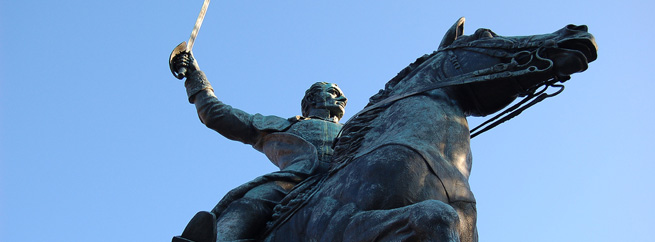
Who Killed Simon Bolivar??
22 August, 2011Take one international hero. The liberator of a continent. A man venerated to the point of deity. Add one populist leader of the people. Add a dash of paranoia, a sprinkle of delusion of grandeur. And cook together a conspiracy theory impossible to prove.
In 2008 Hugo Chavez, the socialist leader of Venezuela, set up a commission to investigate theories suggesting Simon Bolivar had been assassinated, contrary to the accepted story of tuberculosis that Chavez described as “the great farce”.
His remains were exhumed last year to allow forensic tests to be carried out on what remained of his skeleton in an attempt to add evidence to the conjecture. The results came back negative, there was no smoking gun, the tests didn’t point to anything other than a natural death.
Yet this has not derailed Chavez who has since used all the media outlets he can get his hands on to declare his ambivalence to scientific evidence, and maintain his mantra that Bolivar was murdered by Colombian oligarchs.
Cynics and opponents of the Venezuelan president, of which there are many, dismissed his claims long before the scientists appeared to put the final nail back in the coffin.
Chavez is obsessed by Bolivar. He recently renamed his country the Bolivarian Republic of Venezuela. He is constantly quoting and standing in front of pictures of his idol.
Many see this as a simple publicity stunt. Basking in the reflected glory of a man who freed not only his own country, but much of the rest of the continent from Spanish rule in the early 1800s. Chavez has portrayed himself as Bolivar’s ideological heir, although there is some debate as to exactly how “socialist” Bolivar actually was, or whether its more something attributed to him posthumously.
The widely accepted version of events is that Bolivar died from tuberculosis while waiting to go into agreed exile in France, convinced his life’s work would crumble. A sad end for a hero.
But questions over a lack of TB-like symptoms described in his and aides’ writings opened questions over the cause of death.
Problems lie in the gap between modern medical knowledge and the rudimentary practices used in 1830 (the year of Bolivar’s death). Many words we use today were not in existence then (including germ, penicillin, or even tuberculosis) and often the treatments while well meaning were dangerous.
Hence the low levels of arsenic found in Bolivar’s bones are on one side used as evidence of collusion, and on the other as a misguided attempt to help a man in pain. Arsenic was a common ingredient in many medicines of the day.
Chavez himself has been the subject of attempted coups and assignations in the past, and it is possible that he sees this as just one more way to link himself to the great man.
It also seems likely that, despite the evidence, Chavez will not let this one go. It may not be the last time we hear this particular tune played from Chavez’s unique and extensive collection of broken records.
Watch this space.
Follow Sounds and Colours: Facebook / Twitter / Instagram / Mixcloud / Soundcloud / Bandcamp
Subscribe to the Sounds and Colours Newsletter for regular updates, news and competitions bringing the best of Latin American culture direct to your Inbox.

